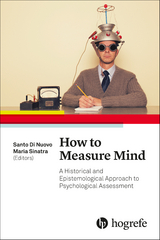How to Measure Mind
Hogrefe Publishing (Verlag)
978-0-88937-587-1 (ISBN)
Get to grips with the debate around the historical epistemological origins of psychometric assessment
* Written by leading experts
* Explores modern and historical aspects
* Full of illustrations
While there have been significant developments in the technical aspects of assessing mental functioning, there is still much to be debated about the motivations and meanings of measuring the mind. How can mental faculties be objectified and what influence does subjectivity have on the object being measured and the mind measuring it? What are the consequences of quantifying complex and interdependent functions and scaling these measurements for psychometric instruments?
The contributors of this edited volume explore these questions by adopting a historical and epistemological approach to consider how psychometric assessment was born and developed within the affirmation of psychology as an empirical science. Chapters explore the birth of the scientific approach, as well as different assessment methods of cognitive abilities and personality traits, and the development of new technologies that support psychological evaluation and its applications in educational and rehabilitative fields.
This book is of interest to researchers of human behavior as well as practicing psychologists and psychiatrists who want to deepen their understanding of the historical and epistemological roots of psychological assessment.
Santo Di Nuovo, PhD, Professor Emeritus of Psychology at the University of Catania, Italy, where he was Dean of the Department of Education. President of the Italian Association of Psychology. His research activity focuses on methodology and psychometrics applied to different areas of psychology: cognitive, personality, normal and pathological, legal, clinical, and rehabilitation. Maria Sinatra, PhD, Professor of Psychology at the University of Bari and at the Institute of Design of Matera, Italy. She has been president of Second Level Degrees, of the Discipline Board, and a Rector's Delegate for Counselling. Her research interests are the historical reconstruction of psychology as well as the psychological aspects of mass-media communication and new addictions.
Preface
1 Examining the Subject-Object Relation in the
Foundation of Scientific Psychology
Maria Sinatra
Introduction
The First Steps Toward the Objectification of the
Psychological Subject
The Error as the Landmark of the Measured Mind
How to Measure the Mind: The Objectification of
Mental Processes
Helmoltzian Sensory Psychology and the Subject-
Object Relationship
Can the Subject Be Investigated Subjectively? From
Brentano to Fechner via Donders
Conclusion
2 The Development of Applied Psychology and
Psychotechnics in Germany: The Contributions
of Walther Moede
Horst Gundlach
Introduction
The Development of Psychotechnics: Walther Moede
Moede from Experimental to Applied Psychologist:
The Role of Psychotechnics
Psychometric Tests for Drivers
From Educational to Industrial Psychology
Critical Issues Within Psychotechnics
Moede's International Contacts Within
Psychotechnics
Moede's Role in the History of Psychotechnics (and
Psychology)
3 Wundtian Objects: The Paradigm of Self-
Observation
Luigi Traetta
Introduction
Psychology as Viewed by Positivists
Early Efforts at Methodologizing Psychology
Why Quantify Mental Events
Psychological Objects
Reality as Subject and Object
4 Psychometrics: From the Past to the Present
Santo Di Nuovo
The Early "Reactive" Psychological Instruments
Attempts to Measure Intelligence: From Mental Age
to IQ, Including Criticisms
Testing in the United States: Enthusiasms and
Debates
Measuring Intelligence Drives Us to Think About
Intelligence
The Sense of Measuring
Beyond the Limits of "Objective" Psychometrics:
Qualitative and Dynamic Assessment
The "Criterial" Tests
"Objective" Measurement of Personality: The
Inventories
The (So-Called) "Projective" Tests
An Attempt at Synthesis: Is a Test an "Objective"
Evaluation Tool?
5 In-Depth Interviews: Self-Observation and the
Emergence of Psychic Reality in Morphological
Psychology
Herbert Fitzek
Subjectivity and Objectivity, Qualitative and Quantitative
Self-Observation: Restriction or Extension of the
Perspective on the Psyche?
Artificial Conditions for the Reconstruction of
Meaning Connections
The Use of Self-Observation in Morphological
Psychology
The Morphological In-Depth Interview
Concrete Forms of Self-Observation in
Morphological Investigations
6 The New Frontiers of Psychometrics: From
Computerized Adaptive Testing to the Use of
Artificial Agents and E- Assessment
Alessandro Di Nuovo and Daniela Conti
The Introduction of Computerization in Diagnosis:
Advantages and Limitations
"Adaptive" Testing
Can Robotics Help With Psychometric Testing?
Electronic Testing: Lessons From the Pandemic
7 From Subject to Object and Vice Versa:
Activities of and in E-Learning
Pierpaolo Limone
Introduction
The Theoretical Background
Educational Online Activities: Reshaping the
Subject-Object Relationship
Evaluation and Assessment Within E-Learning
Activities
| Erscheinungsdatum | 30.08.2022 |
|---|---|
| Verlagsort | Toronto |
| Sprache | englisch |
| Maße | 152 x 228 mm |
| Themenwelt | Geisteswissenschaften ► Psychologie ► Test in der Psychologie |
| ISBN-10 | 0-88937-587-9 / 0889375879 |
| ISBN-13 | 978-0-88937-587-1 / 9780889375871 |
| Zustand | Neuware |
| Informationen gemäß Produktsicherheitsverordnung (GPSR) | |
| Haben Sie eine Frage zum Produkt? |
aus dem Bereich




